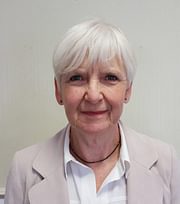
Doing good is good for your business. But how can you be authentic about it?
By Jim James, Founder EASTWEST PR and Host of The UnNoticed Entrepreneur.
Jill Poet is the co-founder and Chief Executive Officer of the Organisation for Responsible Businesses (ORB). In the recent episode of The UnNoticed Entrepreneur, she discussed how it’s important for a business to be responsible and play its part in society when it comes to getting noticed.
Image from LinkedIn
Why Do Good As A Business?
At ORB, they always use the sentence, “Doing good is good for business.” It was true 12 years ago when they founded their company — and it’s much truer today. Whoever your client or potential client is, whether they’re a consumer in the public or private sector, they would want to buy products and services from businesses that care about people and the environment.
And you don’t only need to do these things — you also have to talk about them. You have to put them on your website or LinkedIn profile because people want to know. If people have to make a decision between buying from you and your competitor and you're talking about the good things, you’ll get yourself noticed and they would want to come to you.
However, you have to be careful because there’s this risk of getting accused of greenwashing. It’s when you make a comment on an issue (particularly, an environmental concern) just for the sake of making a comment and not taking action as a result.
This is why at ORB, they support the UK’s Green Claims Code, “which sets out 6 key points to check [if] your environmental claims are genuinely green.” They also always tell their clients to be authentic.
Sometimes, small businesses can say things that advertising people might not like because the statements can be misleading. But if you're authentic — you have core values at the heart of what you are doing and you can evidence anything you say — advertising authorities won’t doubt you.
Determining What You Can Do
ORB has an online course to help you as a business owner focus on what you’re doing — and, if you’re doing it well enough, on what more can you do. This is primarily designed for small businesses but even a CEO of a big corporate can benefit from using this tool.
Image from Unsplash
In this course, they talk about how you can support your people or employees, your supply chain (e.g. how it can possibly impact the lives of indigenous people who you’ll never meet but you still need to be thinking about), your environmental footprint, and your local community.
If you’re a small business, you have to be aware of and be thinking about these things. But you don’t necessarily have to do a lot in every area because you only have a limited amount of capacity. Additionally, there isn’t a one-size-fits-all benchmark.
However, through their tool, you will be able to determine what’s appropriate for the size, type, and impact of your business. You will be guided in thinking about what you’re doing, where you’re doing well, and what you can improve on. You have to pay attention to the things you’re doing well because you can talk about and expand on them — and, as a result, these can help you get your business noticed.
Even if you’ve just had a lightbulb moment, thinking that you need to change what you’re doing — and you’re still in the process of coming up with a more sustainable approach — you can be honest about it and people will appreciate it as well. Although it’s still the beginning of your journey, you’ll have to show that you’re committed to doing good things.
It’s All About Authenticity
Jill has worked with several Corporate Social Responsibility (CSR) departments over the years. And for the majority of them, the focus is on doing CSR projects that are bright, shiny, and designed to catch the attention of the outside world. They may be doing these things but they’re not actually thinking about their local community and not even engaging or caring about their employees. They don’t care about diversity, well-being, and all these sorts of things.
If they were able to get away with it before, they can’t anymore. Now, because of social media and due to the fact that everything is out in the open, being authentic matters. Now, people won’t be interested in you doing bright and shiny things, unless those bright shiny things also equate to the core values of your business. Whether you're a big corporate or small business, they want these good things to be real.
Environment, Society, and Governance
Authentic people are accountable for what they’re doing in their community, workforce, and even in their supply chain. In larger businesses, one of the hottest topics is ESG, which stands for Environment, Society, and Governance.
Though ESG is not a term that Jill usually uses, it’s actually been their approach since they launched their business. They define ORB as one that operates ethically and efficiently; one that always meets and exceeds legislation and cares about people and the environment.
To be a responsible business, you need to proactively try to make a positive difference for people and the environment. For that to happen, you need the right systems in place. You need to be efficient. You need to meet legislation. Unless you're doing all these things, you're not a responsible business. This package altogether is essentially what ESG is. And ORB has been doing it for 12 years now — years before even it gained traction.
Image from Unsplash
As they always say, doing good is good for your business. If you’re operating efficiently and responsibly, you’re going to be a profitable business and people are going to like what you’re doing. You’re going to get noticed and they would want to work with you.
It Doesn't Have to Cost a Thing
Years ago, Jill had a training session with an organisation. Part of their conversation touched on what sort of budget is needed to do CSR. She emphasised that if you’re a small business, you actually don’t need any budget at all — because it’s all about core values and not necessarily about all these projects.
If you have some funds that you want to put into those, you can do so. You can even do things that organisations like B1G1 and Work for Good do (where a percentage of their turnover profits goes to a good cause). But you don’t have to be focused on needing a budget.
Even when it comes to environment-related things, you can start by doing no-cost things. For instance, if you’re considering buying equipment that will be more environmentally friendly, you can find ad hoc schemes where you can get funding to support purchases that will help you be more sustainable.
It’s only now that things have become complicated because of this big drive that you need to do certain things. For instance, you need to buy an electric car. If you have to change your business vehicle, then you can go for it. But if you already have a car that doesn’t have a particularly high emission impact — it has reasonable miles per gallon and you don't do a lot of mileage — then the most environmentally friendly car you can have is the one that you already got.
You have to be very careful if you want to do the right things. Don't just get carried away by the big wave and all the things out there that make you think that you have to do certain things in certain ways. Bear in mind: Kindness doesn't cost anything. Being a responsible business doesn't have to cost anything; it's a mindset and approach.
A Purpose-Driven Shift
Millennials are now the biggest force in the workplace. And they are far more concerned about who they are working for and what their values are.
At ORB, some of their recent members are people who have walked away from really good careers with good salaries and perks. They've started their own businesses to do things the way they want to. If you look at their websites, you would find statements like, “We will only be working with ethical businesses.” They talk about their own values and how they want to work with like-minded people.
And this is really driving ORB’s whole agenda forward. Jill doesn’t even have to explicitly say, “You have to do this.” It’s a business decision that they have made themselves.
Image from Unsplash
It's a big step to take to really niche down one’s potential client profile, yet every single one of their organisation’s members is absolutely flourishing. The good thing about it is that their business isn’t just doing well, they also get to work with really nice people.
Getting the Organisation for Responsible Businesses Noticed
Much like what any other business is doing, Jill has to talk about what they do at ORB, the purpose behind it, and their values. This is why opportunities like coming to a podcast are always welcome.
Social media also has a big part to play. Personally, Jill likes LinkedIn but she has enlisted someone else to take care of their overall social media presence.
What’s important is to know which platforms are there for you. You don’t have to be ubiquitous. For instance, take a look at your website and visit your About Us page. Use spaces like this to say how long you have been in the business and what are the services and products that you provide. What makes you different? What makes you stand out? Remember that your values will help you get noticed.
When you’re busy, you tend to forget to do these things. If the trade is bad and you haven’t got much money, you also tend to forego doing these things that you need to do to get noticed. But you need to keep these going permanently — always make sure that you're out there.
Do whatever it is that works for and fits well with your business. You can even apply for awards. However, when you’re specifically gathering certifications, badges, or memberships to organisations (like ORB), don’t just collect. Make sure that they really have value because if you’re doing something just to tick off the box, people are going to see through it. At the end of the day, it all comes down to being authentic.
Image from Unsplash
Talking about her favourite responsible business activities, Jill mentioned how many of their members, particularly millennials, have a particular focus on the environment. They’re passionate and knowledgeable about it and they write about it on LinkedIn. And seeing these businesses not just promote themselves but talk with purpose about what they believe and what they’re passionate about is something that she highly appreciates.
They have one member who’s a marketer and a copywriter and she isn't focused on getting corporate clients. But with all the articles on the environment that she’s written, corporate businesses started to come to her, asking her to do work for them. These businesses previously never wanted her because she’s the kind of person who doesn’t want to talk about things just for the sake of talking about them. Now, they are coming to her because they want to do things properly — they want to be sustainable and they know that their message is something that has to be authentic.
To learn more about Organisation for Responsible Businesses, visit https://orbuk.org.uk.
This article is based on a transcript from my podcast The UnNoticed Entrepreneur, you can listen here.
Cover image by Lina Trochez on Unsplash






